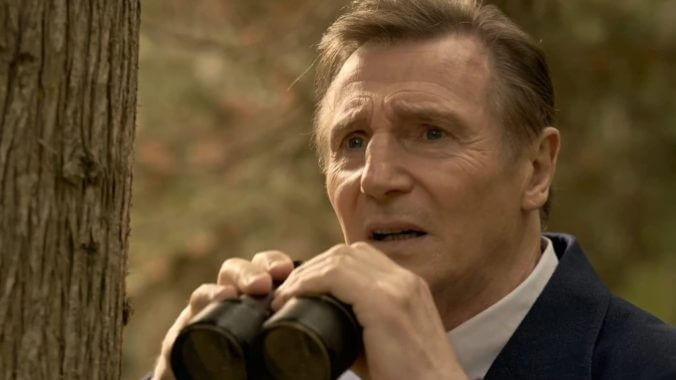
Writer Raymond Chandler’s original character Philip Marlowe, a gumshoe LA detective with a penchant for hard liquor and femme fatales, has graced the silver screen for 80 years via 11 film adaptations, brought to life in iconic performances from Humphrey Bogart, Elliott Gould and Robert Mitchum (among others). Liam Neeson’s turn as the character in Neil Jordan’s Marlowe doesn’t even marginally compare to his predecessors. Despite their talent, Neeson and the rest of the promising cast fail to bring William Monahan’s script (and suspect source material) to life, and occasionally compelling visuals are undone by the misstep of having Barcelona and Dublin stand in for 1939 Los Angeles. The essence of Old Hollywood that the movie wishes to capture drains away.
The 70-year-old Neeson lacks both the physical stamina and charisma to pull off the Marlowe character; his fight and action sequences are sluggish and incredulous, and there’s zero chemistry between Marlowe and Clare Cavendish (Diane Kruger), the beautiful blond who hires him to investigate the sudden disappearance of her former lover Nico Peterson. When the man’s heavily mutilated body is found just off the grounds of the ultra-exclusive Corbata Club, the two believe that there’s a conspiracy afoot. Marlowe uncovers a connection between Nico and “the Mexicans,” a vague crime syndicate that predictably smuggles drugs across the border. Realizing that several parties wish Nico dead and don’t buy into his sudden expiration, Marlowe must race against time to find the man’s whereabouts and uncover whatever scandal that embroils him, before more people lose their lives. While Clare doggedly pursues a tryst with the detective, so does her mother Dorothy (Jessica Lange), an aging starlet who believes that her daughter might be more involved in Nico’s disappearance than she lets on.
Perhaps the first hint that Marlowe would inevitably pale in comparison to its cinematic precursors has to do with the film’s source novel. As opposed to formidable entries in the Phillip Marlowe canon like Murder, My Sweet, The Big Sleep and The Long Goodbye, Marlowe is not actually adapted from a Raymond Chandler work, but from a recent John Banville novel “authorized” by the late writer’s estate. It’s unclear if this creative decision has anything to do with the fact that Marlowe is so uncharacteristically mellow in this version — Neeson doesn’t capture his whiskey-guzzling, flirtatious bachelor spirit, and barely convinces that he can successfully throw a punch, either. The choreography does little to refute the idea that his on-screen opponents were simply commanded to stand near-frozen until Neeson could boink them over the head or shoot a slug into their foot.
While cinematographer Xavi Giménez manages to suffuse certain shots with a momentary hazy beauty, there’s no ignoring that the character of Los Angeles is itself regrettably absent from the film. The last Phillip Marlowe adaptation to make this mistake was the 1978 remake of The Big Sleep, which had Mitchum reprise his role from Farewell, My Lovely (which was appropriately set in Los Angeles in 1941), this time relocating to ‘70s England. It’s important to note that that creative decision, and the film in general, was widely panned, even with Mitchum returning to a role that earned him praise just a few years earlier. While Marlowe doesn’t dare transplant the story to a different setting, utilizing Barcelona as a stand-in isn’t really effective. Sure, it also has palm trees and Spanish-speaking people (though that itself is a touchy subject in a region that has long sought autonomy from Spain), but starting from scratch to achieve that Hollywood charm only works against the film’s favor. The same thing could be said for the film’s Dublin-based interior shots, which are dreadfully dreary and lack the era-specific flourishes that are easily available within LA (and especially its readily-stocked bounty of studio lots and prop departments).
If the narrative that Marlowe weaves during its nearly two-hour runtime had any modicum of wit or a genuine whodunit sensibility, at least some of these gripes could be justified or ignored. The story messily unravels as opposed to cleverly unfolding, featuring nonsensical revelations that don’t even have the guts to be confounding, settling for cliché instead. However, the central frustration of the film is predicated on the fact that Neeson seems flat-out bored during the entire ordeal, playing Marlowe as dully virtuous: refraining from relations with a woman due to the fact that she’s simply “too beautiful” and downplaying the usual brand of alcoholic broodiness that allows the character to lean toward pathetic misanthropy and lone heroism in equal measures. There’s just not an iota of seediness or sensuality present in his performance. When Neeson utters “I’m getting too old for this shit” during the first act of Marlowe, you believe him.
Director: Neil Jordan
Writer: William Monahan
Stars: Liam Neeson, Diane Kruger, Jessica Lange, Adewale Akinnuoye-Agbaje, Alan Cumming, Colm Meaney, Daniela Melchior, Danny Huston, François Arnaud
Release Date: February 17, 2022 (Open Road Films)
Natalia Keogan is Filmmaker Magazine’s web editor, and regularly contributes freelance film reviews here at Paste. Her writing has also appeared in Blood Knife Magazine, SlashFilm and Daily Grindhouse, among others. She lives in Queens with her large orange cat. Find her on Twitter @nataliakeogan